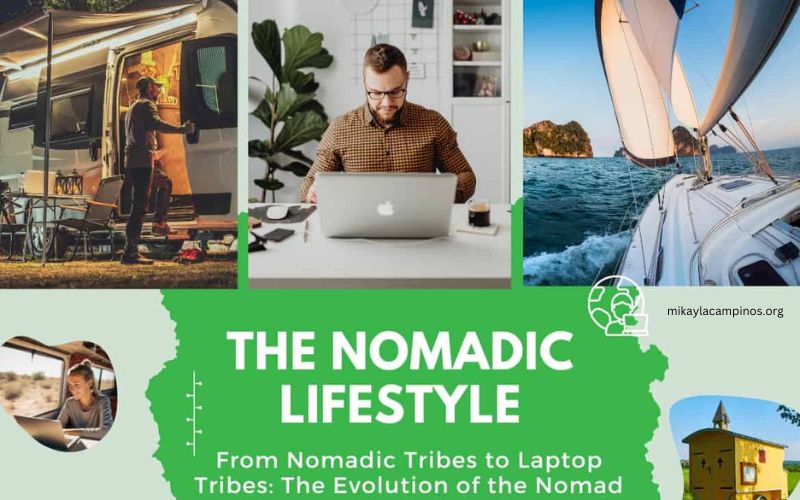Imagine a life without the constraints of a permanent address, a 9-to-5 job, or the constant need to accumulate material possessions. This is the essence of the nomadic lifestyle – a way of living that embraces freedom, flexibility, and a deep connection to the world around you. As you embark on this journey, you’ll discover a world of possibilities that challenges the traditional notions of how we live, work, and find fulfillment.
The nomadic lifestyle is a deliberate choice to eschew the conventional path and instead, embrace a life of constant movement and exploration. Whether it’s traversing the vast landscapes of different countries, living out of a van, or simply packing up and moving to a new city on a whim, the nomadic lifestyle offers a refreshing alternative to the often-stagnant routines of modern life.
History and Origins of the Nomadic Lifestyle
The roots of the nomadic lifestyle can be traced back to ancient civilizations, where communities of nomadic people roamed the earth in search of resources, better grazing lands for their livestock, or simply the thrill of discovery. From the Mongolian herdsmen of Central Asia to the Bedouin tribes of the Middle East, the nomadic way of life has been a testament to human adaptability and resilience.
Throughout history, various factors have shaped the evolution of the nomadic lifestyle. Economic and social upheavals, political instability, and the search for a more sustainable way of living have all contributed to the ongoing appeal of this unconventional way of life. In the modern era, the rise of digital nomadism and the increasing accessibility of remote work have further fueled the growth of the nomadic movement.
Modern-Day Nomads and Their Motivations
Today, the nomadic lifestyle has taken on a new form, attracting a diverse array of individuals from all walks of life. From young professionals seeking a more fulfilling work-life balance to retirees embracing their golden years with a sense of adventure, the modern-day nomad is a testament to the universal human desire for freedom and self-discovery.
The motivations behind the nomadic lifestyle are as varied as the individuals who choose to embrace it. Some are driven by a deep-seated wanderlust, a yearning to explore the world and immerse themselves in different cultures. Others seek to escape the stresses and constraints of traditional living, opting for a more minimalist and intentional approach to their daily lives. And for many, the nomadic lifestyle represents a means to achieve financial independence, allowing them to work remotely and control their own schedules.
Benefits of a Nomadic Lifestyle
The allure of the nomadic lifestyle lies in the myriad of benefits it can offer. By breaking free from the confines of a permanent residence and the accumulation of material possessions, you can experience a newfound sense of liberation and personal growth.
- Increased Flexibility and Spontaneity: The nomadic lifestyle allows you to adapt to changing circumstances and seize opportunities as they arise. You can spontaneously change your travel plans, explore new destinations, or pursue unexpected passions without the burden of a fixed routine or location.
- Reduced Expenses and Financial Freedom: By minimizing your material possessions and living a more minimalist lifestyle, you can significantly reduce your overall expenses. This, in turn, can lead to increased financial freedom and the ability to allocate your resources towards experiences, personal development, or even early retirement.
- Personal Growth and Self-Discovery: The constant exposure to new environments, cultures, and perspectives can foster personal growth and self-discovery. As you navigate the challenges and uncertainties of the nomadic lifestyle, you’ll have the opportunity to develop resilience, adaptability, and a deeper understanding of yourself and the world around you.
- Strengthened Connections and Community: While the nomadic lifestyle may involve periods of solitude, it also presents opportunities to forge meaningful connections with like-minded individuals. By engaging with local communities and fellow nomads, you can build a supportive network and explore the world through a shared lens of exploration and adventure.
- Improved Health and Well-being: The nomadic lifestyle often involves increased physical activity, exposure to natural environments, and a more intentional approach to self-care. This can lead to improved physical and mental health, as well as a greater sense of overall well-being.
Challenges of a Nomadic Lifestyle
While the nomadic lifestyle offers numerous benefits, it also presents its fair share of challenges that aspiring nomads must be prepared to navigate. Understanding and addressing these challenges can help you make an informed decision and ensure a smoother transition into this unconventional way of living.
- Lack of Stability and Routine: The constant movement and change inherent in the nomadic lifestyle can be exhilarating, but it can also be disorienting. Adapting to a lack of a fixed routine and the need to constantly plan and prepare for your next destination can be mentally and emotionally taxing.
- Maintaining Relationships and Social Connections: Staying connected with family, friends, and loved ones can be more challenging when you’re constantly on the move. Finding ways to nurture and sustain meaningful relationships while embracing the nomadic lifestyle requires intentionality and creativity.
- Logistical Challenges: Navigating the practical aspects of the nomadic lifestyle, such as managing finances, healthcare, and legal documentation, can be complex and time-consuming. Staying organized and proactive in addressing these logistical concerns is crucial for a successful nomadic journey.
- Uncertainty and Unpredictability: The nomadic lifestyle inherently involves a certain degree of uncertainty and unpredictability. Adapting to changing circumstances, unexpected setbacks, and the unknown can be both exhilarating and daunting, requiring a high level of resilience and adaptability.
- Potential Isolation and Loneliness: While the nomadic lifestyle can foster meaningful connections, it can also lead to feelings of isolation and loneliness, especially during periods of solitude or when transitioning between communities. Finding ways to cultivate a sense of belonging and community is essential for maintaining mental and emotional well-being.
How to Transition into a Nomadic Lifestyle
Transitioning into a nomadic lifestyle can be an exciting yet daunting prospect. To ensure a smooth and successful transition, it’s essential to approach the process with careful planning and a clear understanding of the necessary steps.
- Assess Your Readiness: Reflect on your motivations, values, and lifestyle preferences to determine if the nomadic lifestyle aligns with your long-term goals and personal needs. Consider your financial situation, commitments, and any potential constraints that may impact your ability to embrace this way of living.
- Declutter and Minimize: Begin the process of decluttering and minimizing your possessions. This not only reduces the physical and emotional burden of moving but also aligns with the minimalist principles often associated with the nomadic lifestyle.
- Explore Remote Work Opportunities: Identify ways to generate income that are compatible with a nomadic lifestyle, such as freelancing, remote work, or location-independent businesses. Develop a plan to transition your current career or explore new income streams that can support your nomadic journey.
- Research and Plan: Thoroughly research the practical aspects of the nomadic lifestyle, such as transportation options, housing alternatives, healthcare considerations, and legal requirements. Develop a comprehensive plan that addresses your specific needs and preferences.
- Start Small and Build Momentum: Begin by experimenting with short-term trips or extended weekend getaways to get a feel for the nomadic lifestyle. Use these experiences to refine your approach and gradually build the confidence and skills needed for a more long-term commitment.
- Cultivate a Support Network: Connect with online communities, local nomadic groups, or experienced nomads who can provide guidance, advice, and a sense of belonging as you navigate the transition. Leverage these networks for practical support, emotional encouragement, and a shared sense of adventure.
Essential Items for a Nomadic Lifestyle
Embracing the nomadic lifestyle often requires a minimalist approach to your possessions. However, there are certain essential items that can make your journey more comfortable, efficient, and enjoyable. Consider the following as a starting point:
- Versatile Backpack or Luggage: Invest in a high-quality, durable, and adaptable backpack or luggage that can accommodate your essential belongings while remaining lightweight and easy to transport.
- Portable Technology: Ensure you have the necessary tech tools, such as a laptop, smartphone, and portable chargers, to maintain productivity and stay connected while on the move.
- Comfortable and Adaptable Clothing: Build a versatile wardrobe that can be easily mixed and matched, suitable for a variety of climates and activities.
- Basic Camping and Cooking Gear: Depending on your preferred mode of travel, consider packing a compact camping stove, cookware, and other essential outdoor gear to maintain self-sufficiency.
- Health and Wellness Essentials: Include items that support your physical and mental well-being, such as a first-aid kit, personal care products, and any necessary medications.
- Paperwork and Documentation: Ensure you have all the necessary legal documents, travel visas, and financial records organized and easily accessible.
- Means of Transportation: Depending on your preferences and budget, consider options like a van, RV, motorcycle, or even a bicycle to facilitate your nomadic adventures.
Popular Destinations for Nomads
The world is your oyster when it comes to the nomadic lifestyle, and there are countless destinations that have become hubs for the global nomadic community. Some of the most popular destinations for nomads include:
- Digital Nomad Hotspots: Cities like Chiang Mai (Thailand), Bali (Indonesia), Medellín (Colombia), and Lisbon (Portugal) have gained a reputation for their thriving digital nomad communities, affordable cost of living, and vibrant cultural offerings.
- Outdoor Adventure Destinations: For those seeking a more nature-centric nomadic experience, destinations like New Zealand, Patagonia (Argentina and Chile), and the American Southwest offer breathtaking landscapes and ample opportunities for outdoor exploration.
- Cultural and Historical Hubs: Cities with rich cultural heritage, such as Marrakech (Morocco), Cuzco (Peru), and Ubud (Bali), provide a unique blend of ancient traditions, art, and culinary delights for the culturally curious nomad.
- Coastal and Island Destinations: Tropical locales like the Canary Islands (Spain), Bali (Indonesia), and the Greek Islands offer a balance of natural beauty, relaxation, and a strong nomadic community.
- Emerging Nomad Hubs: As the nomadic lifestyle continues to gain momentum, new destinations are emerging as hubs for this growing community, such as Mérida (Mexico), Tbilisi (Georgia), and Tallinn (Estonia).
Tips for Working Remotely While Living a Nomadic Lifestyle
One of the key components of the modern nomadic lifestyle is the ability to work remotely. Whether you’re a freelancer, an entrepreneur, or a remote employee, navigating the challenges of maintaining productivity and professional success while constantly on the move requires a strategic approach.
- Establish a Routine: Despite the inherent flexibility of the nomadic lifestyle, it’s essential to maintain a consistent routine to ensure productivity and work-life balance. This may involve setting aside dedicated work hours, establishing a dedicated workspace, and incorporating regular breaks and self-care activities.
- Leverage Technology: Utilize a suite of productivity tools, communication platforms, and cloud-based services to streamline your work processes and stay connected with your clients, colleagues, or employer. Invest in reliable internet connectivity and backup solutions to ensure uninterrupted access to your work.
- Prioritize Communication: Maintain clear and frequent communication with your clients, team, or employer to manage expectations, provide updates, and address any concerns that may arise due to your nomadic lifestyle. Establish effective channels for collaboration and feedback.
- Embrace Flexibility: Recognize that the nomadic lifestyle may require a certain level of flexibility in your work arrangements. Be prepared to adapt your schedule, work processes, and even the scope of your projects to accommodate the unique challenges and opportunities that arise from your constant mobility.
- Cultivate a Professional Network: Actively engage with online communities, attend virtual events, and leverage your existing professional connections to maintain a strong network that can support your remote work endeavors. This can lead to new opportunities, referrals, and a sense of belonging within your industry.
- Maintain Work-Life Balance: Ensure that your nomadic lifestyle doesn’t compromise your overall well-being. Set boundaries, take regular breaks, and make time for self-care activities to prevent burnout and maintain a healthy work-life balance.
Nomadic Communities and Support Networks
One of the most remarkable aspects of the nomadic lifestyle is the vibrant and supportive community that has emerged to embrace this unconventional way of living. Whether you’re just starting your nomadic journey or have been on the road for years, tapping into these communities can provide invaluable resources, camaraderie, and a sense of belonging.
Online platforms, such as digital nomad forums, Facebook groups, and subreddits, offer a wealth of information, advice, and connections with fellow nomads. These virtual communities serve as hubs for sharing travel tips, job opportunities, and even organizing in-person meetups and events.
Additionally, many physical locations around the world have become hubs for nomadic communities, offering coworking spaces, shared living accommodations, and a supportive network of like-minded individuals. From Ubud in Bali to Medellin in Colombia, these nomadic enclaves provide a sense of community, resources, and a shared sense of adventure.
By engaging with these nomadic communities, you can access a wealth of knowledge, find mentorship and support, and forge meaningful connections with individuals who understand the unique joys and challenges of the nomadic lifestyle.
Personal Stories and Experiences of Nomads
The nomadic lifestyle is a deeply personal and transformative experience, and the stories of those who have embraced it are a testament to the power of this unconventional way of living. From the retiree who traded in their suburban home for a life on the open road to the young professional who left the corporate grind to pursue their creative passions, these narratives offer a glimpse into the diverse motivations and life-changing journeys of modern-day nomads.
One such story is that of Sarah, a former corporate executive who, after a decade of climbing the corporate ladder, felt a growing sense of dissatisfaction with the traditional path. “I had everything that society told me I should want – a high-paying job, a beautiful home, and all the material possessions I could ever need,” she recalls. “But there was a nagging feeling that something was missing. I knew I had to make a change.”
Sarah’s journey into the nomadic lifestyle began with a solo trip to Southeast Asia, where she was captivated by the freedom and simplicity of the region’s digital nomad community. “Seeing these individuals living and working on their own terms, unencumbered by the trappings of traditional life, was a revelation. I knew that’s what I wanted for myself.”
Upon returning home, Sarah took the leap, selling her belongings, quitting her job, and embarking on a life of constant travel and remote work. “It wasn’t an easy decision, but the moment I stepped onto that first plane, I felt a sense of liberation and possibility that I had never experienced before. The nomadic lifestyle has allowed me to discover new passions, forge meaningful connections, and ultimately, find a deeper sense of purpose and fulfillment.”
Stories like Sarah’s are a testament to the transformative power of the nomadic lifestyle, inspiring others to step outside the boundaries of conventional living and embrace the freedom, adventure, and personal growth that this unconventional way of life can offer.
Conclusion
As you’ve explored the various facets of the nomadic lifestyle, you may be left wondering, “Is this way of living right for me?” The answer, of course, is highly personal and depends on your individual circumstances, values, and aspirations.
The nomadic lifestyle is not a one-size-fits-all solution, and it’s essential to carefully consider the benefits and challenges that come with this unconventional way of living. While the promise of freedom, flexibility, and personal growth may be alluring, it’s crucial to assess your readiness, financial stability, and ability to adapt to the uncertainties and logistical complexities that often accompany the nomadic journey.
Ultimately, the decision to embrace the nomadic lifestyle is a deeply personal one, and it’s essential to approach it with a clear understanding of your motivations, needs, and long-term goals. By carefully weighing the pros and cons, seeking guidance from experienced nomads, and taking the time to experiment with short-term forays into this way of living, you can make an informed decision that aligns with your unique circumstances and aspirations.




Este site é realmente demais. Sempre que consigo acessar eu encontro coisas boas Você também vai querer acessar o nosso site e descobrir detalhes! informaçõesexclusivas. Venha descobrir mais agora! 🙂